
TWENTIETH CENTURY LITERATURE
Scope & Guideline
Navigating the Evolution of Literary Expression
Introduction
Aims and Scopes
- Interdisciplinary Literary Analysis:
The journal emphasizes the importance of interdisciplinary approaches in understanding literature, drawing from fields such as history, sociology, anthropology, and cultural studies to enrich the literary discourse. - Focus on Marginalized Voices:
A consistent focus on marginalized voices, including Black, Latinx, and postcolonial writers, highlights the journal’s commitment to exploring diverse narratives and the complexities of identity, race, and gender in literature. - Modernist and Postmodernist Literature:
The journal frequently engages with modernist and postmodernist texts, analyzing their forms, techniques, and thematic concerns, thereby contributing to the broader understanding of literary innovation during these periods. - Cultural and Historical Contextualization:
Papers often examine the cultural and historical contexts surrounding literary works, providing insights into how social, political, and economic factors shape literary production and reception. - Exploration of New Literary Theories:
The journal is a forum for new literary theories and methodologies, encouraging innovative readings and interpretations of texts that challenge conventional understandings.
Trending and Emerging
- Posthumanism and Animal Studies:
An increasing number of publications explore posthumanism and animal studies, highlighting the intersections between literature, ethics, and the evolving understanding of subjectivity beyond the human experience. - Environmental Literature and Ecocriticism:
The emergence of ecocritical perspectives is evident, as scholars analyze the relationship between literature and ecological concerns, reflecting a growing awareness of environmental issues in literary narratives. - Transnational and Global Perspectives:
There is a noticeable trend towards transnational and global perspectives in literary studies, with a focus on how literature circulates across borders and engages with global issues, reflecting the interconnectedness of contemporary society. - Intersectionality in Literary Studies:
The application of intersectional frameworks in literary analysis is gaining traction, allowing for a more nuanced understanding of how various identities (race, gender, sexuality) intersect within literary texts. - Digital Humanities and Literature:
The integration of digital humanities in literary studies is emerging, with scholars utilizing digital tools and methodologies to analyze texts and engage with literature in innovative ways.
Declining or Waning
- Traditional Historical Narratives:
There is a noticeable waning of interest in traditional historical narratives that focus solely on canonical texts without considering broader cultural implications or intersections with contemporary issues. - Exclusive Focus on Eurocentric Literature:
The journal's earlier emphasis on Eurocentric literary works and authors is decreasing, as there is a growing recognition of the need to include a more diverse range of literary voices from different cultural backgrounds. - Static Gender Studies:
While gender studies remain relevant, the analysis of gender in a static or binary framework is becoming less prominent, as more nuanced and intersectional approaches are favored. - Fixed Literary Canon:
The adherence to a fixed literary canon is declining, as the journal increasingly supports the exploration of texts outside traditional boundaries, reflecting a more fluid understanding of literary significance. - Over-reliance on Close Reading:
The method of close reading, while still valuable, is becoming less central as the journal embraces broader contextual analyses and interdisciplinary approaches that incorporate diverse methodologies.
Similar Journals
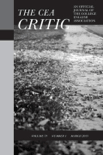
CEA CRITIC
Challenging norms, enriching perspectives.CEA CRITIC, published by Johns Hopkins University Press, is a reputable journal that contributes significantly to the fields of Education, Literature, and Literary Theory. With an ISSN of 0007-8069 and E-ISSN of 2327-5898, the journal has been a vital platform for scholarly discourse since its inception in 2002, reinforcing its commitment to advancing knowledge and critical analysis in literature and education through to 2024. Though currently indicated in Q4 quartile rankings, CEA CRITIC welcomes submissions that challenge established norms and explore innovative perspectives, making it an essential resource for researchers, educators, and students alike. As an important outlet for original research and in-depth reviews, this journal strives to foster a vibrant academic community by offering insights that resonate both within and beyond the classroom. Engage with CEA CRITIC to share your scholarly work and contribute to this evolving dialogue in contemporary education and literary studies.
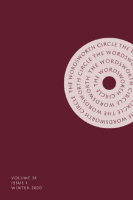
WORDSWORTH CIRCLE
Cultivating Insight in Literature and Cultural TheoryWORDSWORTH CIRCLE, an esteemed journal published by University of Chicago Press, serves as a pivotal platform for scholars and enthusiasts in the fields of Cultural Studies and Literature and Literary Theory. With a firm foundation established from 2002 and expected to continue through 2024, the journal is recognized for its rigorous scholarship, evident in its prestigious ranking of Q1 in Literature and Literary Theory and Q2 in Cultural Studies for the year 2023. Although it is not an open-access journal, its valuable contributions to the discourse surrounding literary analysis and cultural critique make it a significant resource for researchers, students, and practitioners seeking to deepen their understanding of these dynamic fields. The journal's ISSN is 0043-8006, and it operates out of Chicago, IL, with its influence resonating across academic institutions and literary circles globally. By bridging historical perspectives and contemporary discussions, WORDSWORTH CIRCLE remains an essential publication for those dedicated to exploring the complexities of literature and culture.
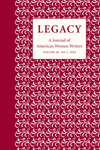
LEGACY
Fostering Critical Dialogue in Literary and Gender StudiesLEGACY is a prominent journal published by University of Nebraska Press, dedicated to exploring the multifaceted relationships between literature, culture, and gender studies. With an ISSN of 0748-4321, this journal has established itself as a platform for critical discourse since its inception in 2002. As a Q4 ranked publication in both Gender Studies and Literature and Literary Theory, LEGACY engages with diverse perspectives and timely topics, providing a unique opportunity for scholars to contribute to ongoing debates in these fields. Although it does not operate under an open access model, its content remains essential for researchers, professionals, and students seeking to expand their knowledge and understanding of complex literary and gender issues. With a commitment to enriching the academic landscape, LEGACY aims to foster dialogue and inspire future scholarship through its thoughtful articles and critical analyses.

Literatura Mexicana
Empowering Research in the Heart of Mexican LiteratureLiteratura Mexicana is a distinguished academic journal dedicated to the exploration of Mexican literature and cultural studies. Published by the Universidad Nacional Autónoma de México through its Inst. Investigaciones Filológicas, this journal has been an essential resource for scholars since its transition to Open Access in 2011, promoting widespread dissemination of research findings without the barriers of paywalls. With ISSN 0188-2546 and E-ISSN 2448-8216, it aims to foster an interdisciplinary dialogue on themes relevant to Mexican literary discourse, including but not limited to historical context, cultural representation, and critical theory. By providing a platform for innovative research and scholarly debate, Literatura Mexicana plays a vital role in advancing knowledge and understanding within the academic community, making it an invaluable resource for researchers, professionals, and students alike. Its commitment to enriching the field ensures that it remains at the forefront of literary studies and cultural critique in Mexico and beyond.

REVISTA DE LITERATURA
Connecting scholars through cutting-edge literary research.REVISTA DE LITERATURA, published by the Consejo Superior de Investigaciones Científicas (CSIC) in Spain, stands as a beacon of scholarly excellence in the field of Literature and Literary Theory. With an impressive Q1 ranking in its category for 2023, the journal has established a reputable position within the academic community, reflected in its Scopus rank of #427 out of 1106, placing it in the top 61st percentile. Operating under an Open Access model since 2001, it ensures that cutting-edge research on literary texts, theories, and critical practices is freely accessible to all, fostering scholarly dialogue and enhancing the global discourse on literature. The journal’s continuous commitment to advancing literary scholarship from 1996 to 2024 highlights its role in addressing contemporary literary challenges while celebrating diverse voices and ideas. Researchers, professionals, and students alike are encouraged to engage with this vital resource, which not only showcases innovative research but also contributes significantly to the richness of literary studies.

Studia Theodisca
Pioneering Research in Cultural NarrativesStudia Theodisca is a distinguished academic journal published by Milano University Press that has been contributing to the fields of Cultural Studies and Literature and Literary Theory since its inception. With an ISSN of 1593-2478 and E-ISSN 2385-2917, this Open Access journal, available since 1994, ensures that research is freely accessible, fostering a global exchange of ideas. Located in Milan, Italy, the journal has gained traction within the academic community, reflected in its rankings: Q4 in Cultural Studies and Q3 in Literature and Literary Theory as of 2023. Despite its relatively new presence in Scopus, being placed in the ranks of 733 out of 1106 for Literature and Literary Theory and 1092 out of 1304 for Cultural Studies, it remains committed to advancing scholarly dialogue and exploring diverse narratives. Studia Theodisca serves as a vital platform for researchers, professionals, and students seeking to engage with innovative contributions and contemporary thought in these dynamic areas of study.
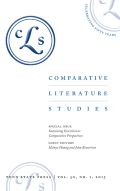
COMPARATIVE LITERATURE STUDIES
Connecting Cultures through Critical AnalysisComparative Literature Studies is a distinguished journal published by Penn State University Press, focusing on the diverse and evolving field of comparative literature. With an ISSN of 0010-4132 and an E-ISSN of 1528-4212, this quarterly journal has been a critical platform for scholarly dialogue and interdisciplinary research since its inception in 2000. The journal proudly ranks in the Q3 category for Cultural Studies and Q2 for Literature and Literary Theory (2023), showcasing its significant impact within these domains. Notably, it ranks #214/1106 in Literature and Literary Theory according to Scopus, placing it in the 80th percentile—highlighting its relevance and quality in the global academic landscape. Despite its traditional subscription model, the journal remains a crucial resource for researchers, professionals, and students keen on exploring the intersections of cultures, texts, and histories. By publishing cutting-edge research and critical essays, Comparative Literature Studies aims to expand the horizons of literary analysis and foster innovative scholarly exchanges.
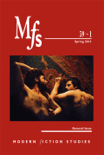
MFS-Modern Fiction Studies
Decoding the Evolution of Modern FictionMFS-Modern Fiction Studies is a premier journal in the field of literature and literary theory, published by Johns Hopkins University Press. With an impressive impact factor and a 2023 classification in Q1, this journal stands out as a vital resource for scholars, researchers, and practitioners interested in contemporary fiction analysis and criticism. The journal aims to foster innovative scholarship, enhance discussions around literary trends, and explore the intricacies of modern narrative forms. Notably, it ranks #119 among 1,106 in the Scopus Arts and Humanities category, placing it within the top 89th percentile. Published four times a year, MFS is committed to making significant contributions to the understanding of modern fiction, making it a must-read for anyone vested in the evolution of literature. Access options are available through institutional subscriptions, ensuring that readers can engage with cutting-edge research and discourse in the literary community.
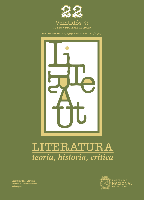
Literatura-Teoria Historia Critica
Catalyzing Critical Thought in Literary TheoryLiteratura-Teoria Historia Critica is a distinguished open-access journal published by UNIV NAC COLOMBIA, FAC CIENCIAS HUMANAS, that has been at the forefront of literary scholarship since its inception in 2004. With an ISSN of 0123-5931 and E-ISSN of 2256-5450, it provides an invaluable platform for researchers, professionals, and students in the field of Literature and Literary Theory. The journal's significance is underscored by its remarkable placement in the Q1 category within its field in the year 2023, as well as its Scopus ranking of #556 out of 1106 in Arts and Humanities, highlighting its influence and reach. The journal aims to foster academic discourse by publishing high-quality research articles that scrutinize literary texts, theories, and histories, facilitating a deeper understanding of literature's role in society. With a commitment to accessibility and scholarly rigor, Literatura-Teoria Historia Critica is an essential resource for those seeking to enrich their knowledge and engage with contemporary literary debates.

Taller de Letras
Advancing Critical Conversations in LiteratureTaller de Letras is a renowned academic journal published by the Pontificia Universidad Católica de Chile, specifically from the Faculty of Letters. With an ISSN of 0716-0798, this journal holds a significant position in the field of Literature and Literary Theory, enjoying a commendable Q2 quartile ranking as of 2023. It operates under the auspices of a prestigious institution, promoting high-quality scholarly discourse within its scope, which spans a wide array of literary studies. Although the journal does not offer Open Access, its contributions are pivotal for researchers, professionals, and students seeking to enhance their understanding of contemporary literary trends and theories, establishing a critical dialogue within the literary community. With coverage extending through a converged lifespan from 2011 to 2024, Taller de Letras continues to be a valuable resource for those engaged in the vibrant fields of literature and criticism.